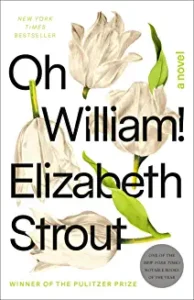Oh, William by Elizabeth Strout
This is the fourth in Strout’s Olive Kittridge series and a short-listed book for the 2022 Booker Prize. Olive doesn’t make a cameo in this book which is narrated in the first person by Lucy Barton. It’s written in a quirky style of conversational writing with frequent asides, flashbacks, and digressions, but it works, as we join Lucy and her ex-husband, the eponymous William, on a trip to Maine to find his long-lost older half-sister.
Along the way we catch up with Lucy’s and William’s lives—-Lucy’s successful writing career, their divorce after William’s affair with Lucy’s good friend, their two daughters, Lucy’s second husband’s death two years earlier, William’s third wife’s and daughter’s sudden departure—and learn about their early years. Childhood and its impact on later life is a central theme of the book. Lucy, and in a surprise to both of them, William’s mother both grew up in extreme poverty, and Lucy, at least, appears to have been abused by her parents. Each of them reacted in different ways. Lucy always felt invisible and out of place, even after a life of successful mothering and writing. Catherine compensated by dressing beautifully and holding court from NYC to the Cayman Islands. William, too, has been deeply affected by a childhood in which the main feature was the early loss of his father who had been a Nazi soldier and a POW in Maine where he married Catherine who left her husband and one year old daughter to marry him.
It is in search of that daughter that is the core of the book as William and Lucy travel to rural Maine to find her. Along the way, they find each other again and discover that, in Lucy’s words, “who ever really knows the experience of another.” and “If you have not been there, you cannot know.” This theme of the inability to really know another person (and perhaps yourself, as well) is central to the book, and reflected in Lucy’s oft repeated cry (usually internal) of Oh, William. Her compassion, caring, and love for this man who has treated her poorly is a thing of wonder and beauty. Oh, Lucy!
I had recently read “Lucy by the Sea” which is the sequel to this book, so I was sometimes confused and sometimes aided by the knowledge of what happens to these characters in the future. I think that these Strout books are best read in order as the stories build upon one another. Despite that ‘disorder’, I liked this book very much for its content as well as for its unusual style. It didn’t win the Booker, but it’s a prize nonetheless.



